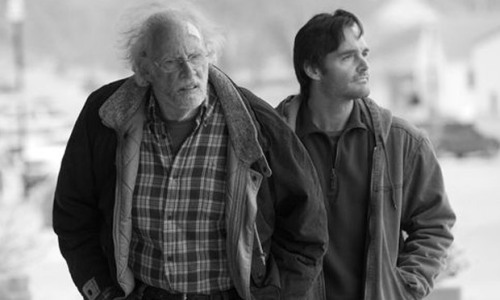Delightfully funny and surprisingly soulful, “Nebraska” is filmmaker Alexander Payne’s comic valentine to small-town America.
Fuelled by terrific perfs from veteran Bruce Dern and “SNL” alumn Will Forte as a father and son on a raggedy road trip — and shot in black-and-white so gorgeous you wonder why Hollywood ever let it go — “Nebraska” skewers small minds while celebrating big hearts.
Having it both ways has long been Payne’s trademark (“Sideways,” “About Schmidt,” “The Descendants”), but this time he’s refined his approach to near perfection. “Nebraska” is more than a plot and a collection of performances — it’s afeeling, a state of mind.
It is pretty freakin’ sublime.
Woody Grant (Dern) is an unshaven old coot who may be drifting off into dementia. Repeatedly he’s been found walking the highway near his home in Billings, Montana; his destination, he tells the cops, is Lincoln, Nebraska, where a fortune awaits him.
In the mail Woody has received one of those publishing sweepstakes prize packets informing him that he may have won $1 million. Now he’s determined to present the dog-eared letter in person and claim his prize.
This unreasonable obsession is making life particularly uncomfortable for Woody’s son David (Forte), a sad sack electronics store salesman who apparently lacks anything like a life. (Confronted by the girlfriend who recently moved out, he hopefully asks “Are we still having sex?”)
David finds himself playing referee between his taciturn father and his mother, Kate (June Squibb), who profanely excoriates her wandering hubby for his congenital foolishness.
Finally, worn down by the stubborn old man’s mania, David agrees to drive him to Lincoln. Perhaps the trip will provide an opportunity to bond with the father who has always been remote and unreachable.
And of course that’s what happens, though not with the fuzzy-warm sentiments you might expect. Payne and screenwriter Bob Nelson (amazingly, this is his first produced feature script) take a minimalist approach to their material that reaps big dividends.
Like David we are frustrated, angered and saddened by Woody’s fixation, and like David we discover pieces of the puzzle that is Woody’s life. But these arrive not in big dramatic revelations; rather, they are parceled out through the slow accumulation of detail.
The movie’s heart lies in a family reunion the Grants attend in Woody’s hometown of Hawthorne, Nebraska. Perhaps only those who come from families of farm folk can appreciate the deadpan hilarity of Woody and his brothers watching televised football like so many unblinking owls. Or the two oafish cousins totally taken in by Woody’s tale of newfound riches. Or Woody’s old partner in a failed business (Stacy Keach) who, smelling money, begins making threats that some of the cash should be his.
Theres rapacious greed here, but also an unexpected sweetness. David discovers that the lady who publishes Hawthorne’s newspaper was once Woody’s old flame. Yeah, small towners can be insular and ridiculous. But there’s also plenty of humanity out there on the Great Plains.
The performances cannot be faulted. Dern, after a lifetime of playing bad guys, gets to sink his teeth into a complex character. Is Woody truly slipping off the deep end? Does he really believe that he’s a winner? Or is his stubborn quest a desperate attempt to redeem a life that has been frittered away?
Dern has it both ways. This is a classic case of underacting, and like the film as a whole, near-silence speaks loudly.
Up to now I’ve known Forte only as a comic actor, but here he beautifully navigates David’s haplessness and his growing appreciation of his parents’ uneventful lives. Taking care of his wayward dad, this son becomes father to his father.
Squibb, who appeared as Jack Nicholson’s wife in “About Schmidt,” proves an adept scene stealer as the tart-tongued Kate, and Bob Odenkirk (“Breaking Bad”) is an affable presense as David’s older brother.
Cinematographer Phedon Papamichael — whose credits range from ”Sideways” and “The Descendants” to “3:10 to Yuma” and “Walk the Line” — revels in the crisp b&w images, which have a power and impact far greater than color photography. And Mart Orton’s musical score — often featuring just a country fiddle and guitar — effortlessly reinforces the film’s minimalist zeitgeist.









